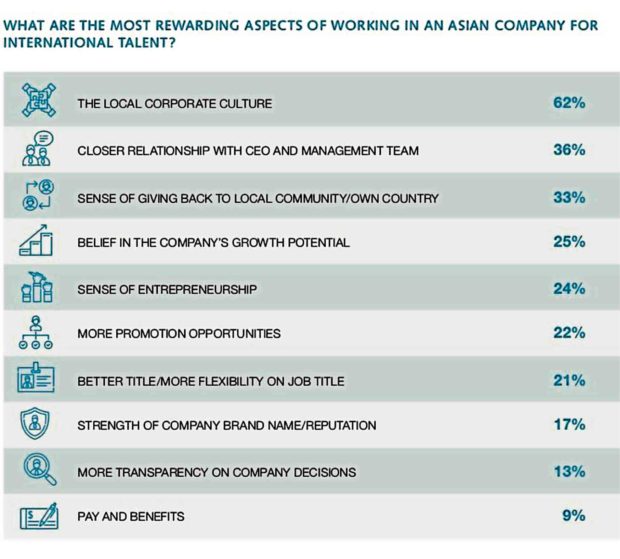Attracting, retaining the right talent

These are a couple of hiring strategies recommended to Asian companies by recruitment consultancy firm Robert Walters in its recent whitepaper, “How to Attract and Retain the Right Talent to Grow Your Business Internationally.” The report aims to assist Asian companies (those headquartered in China, Indonesia, Malaysia, Singapore, Taiwan, Thailand, Vietnam, and the Philippines) in their international expansion by identifying what motivates international talents (homegrown or returning professionals who have worked in Western companies—firms headquartered outside Asia—whether in their respective home countries or abroad) to join and stay in such firms.
The whitepaper is based on a survey conducted by Robert Walters, which gathered views of over 5,000 HR professionals, hiring managers, and employee candidates working in both Asian and Western companies across the eight aforementioned Asian markets.
Priya Gupta, Robert Walters Philippines’ banking and financial services manager, says the study was brought about by the latest Global Fortune 500 list, 40 percent of which includes Asian companies.
“We see that the power is shifting toward the east; Asian companies, therefore, have the potential to increase their international footprint,” says Gupta.
In fact, according to Robert Walters’ data, 70 percent of the companies they surveyed said that they were planning to go global in the next three years.
To do that, says Gupta, companies need to secure individuals—from managers to senior managers to VP-level executives—whose expertise best fit their expansion goals.
The first step Asian companies need to take, according to the report, is to attract talent, and the top motivators, unsurprisingly, are great pay and benefits.
But companies must also look beyond pay, notes Gupta, as professionals surveyed said that they were also motivated by a company’s strong growth potential and the career opportunities this can open.
The whitepaper also touches on the recruitment channels companies prefer to tap when searching for new talent.
Recruitment consultants like Robert Walters remain top of mind for both Western and Asian companies, followed by job boards and job ads on professional networking sites.
The report makes note of how Asian companies still prefer personal referrals from existing professional networks, creating the so-called “face” concept—the employee who makes the recommendation and the person hired because of such recommendation both feel obliged to stay with the company so long as one of them is still there.
After attracting the right talent comes the harder part: getting them to stay.
According to the report, the top three reasons given by those surveyed for leaving a job in an Asian company are: the lack of a clear path for personal progression; inadequate professional training and personal development programs; and a less attractive brand image/reputation compared to that of Western companies.
On the other hand, what does motivate the majority of them to stay in Asian companies is the local corporate culture (62 percent), followed by the closer relationship with the CEO and management team (36 percent) and the sense of giving back to their home country.
Robert Walters therefore recommends three key steps in attracting and retaining international talent.
First, build your employer proposition (competitive salary range; expansion plans for the next five to 10 years; advantages over Western companies); maintain and build a unique company culture (collaboration and teamwork over bureaucracy and formal structures; a sociable workplace); and, finally, provide structured training and career development programs.